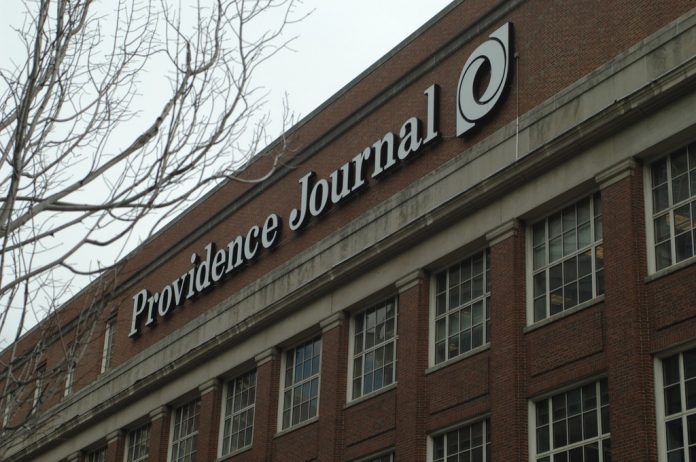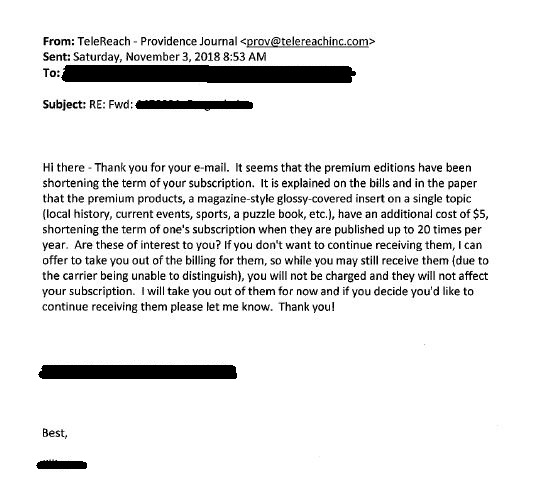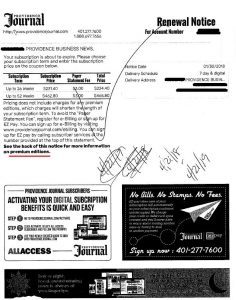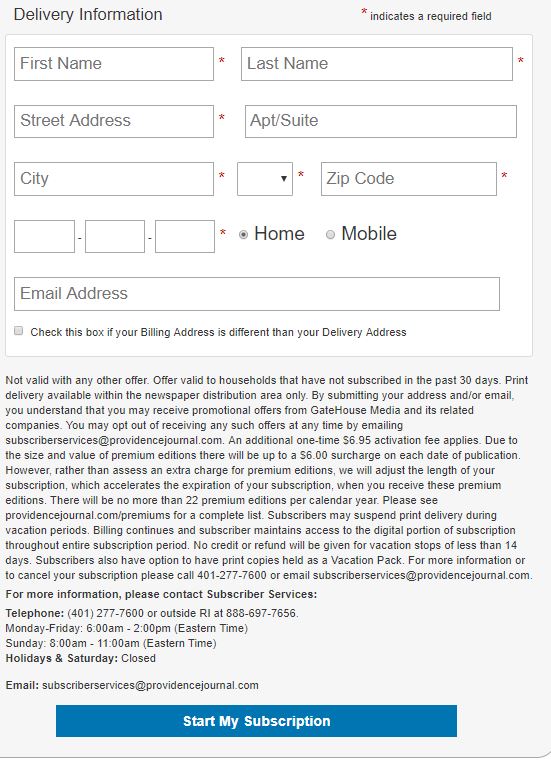
PROVIDENCE – Special supplements included in a subscription to the print edition of the Providence Journal, and delivered whether requested or not, can shorten the term of a customer’s subscription.
The paper, in its subscription terms listed on its site, notes that by subscribing to the GateHouse Media Inc. property, a reader agrees to pay up to $6 each for up to 22 supplements per year, the value of which is subtracted from the subscription payment, thereby shortening its term.
In an email to PBN regarding its subscription to the Providence Journal, a representative for the newspaper said that the company charges $5 each up to 20 times per year – less than the company said it may charge on its website – for supplements termed “premium editions” that include a travel guide to the United States, a summer guide to Rhode Island and a gamebook with puzzles, games and the like, among others.

The policy was noticed following a billing error involving PBN’s Providence Journal subscription. The company’s 52-week subscription was treated as a 26-week subscription – prompting a premature renewal notice to be sent to PBN. However, even the incorrect 26-week subscription did not last 26 weeks, with the Journal saying that the subscription would expire between 21 and 22 weeks from its beginning, the result of the Journal charging PBN for inserts to its paper and deducting the value of the supplements from the subscription term.
Following a back and forth with the Providence Journal, it was said that PBN was charged for 13 supplements from April 12 through Sept. 8. Following the complaint, the company credited PBN with $80 (roughly $6 for each of the supplements) for previously paid-for inserts. In addition, the adjustment did not extend the term of the subscription to the full year, based on the price quoted on the Journal website.

The representative also told the company that PBN may still receive the sections despite having opted out of paying for them, as a carrier may not be able to distinguish which accounts get inserts and which do not.
At the current web-listed subscription price of $474.95 per year, the charges have the potential to reduce a subscription’s length by 27.8 percent of the advertised subscription length, unless the subscriber opts out of paying for them. That’s a potential shortening of three and one-third months of a purchased subscription.
Neither GateHouse nor the Providence Journal would respond to PBN’s editorial inquiry over the practice. It is not immediately clear how many of GateHouse Media’s 555 markets have premium edition policies that shorten subscriptions. The company operates in 37 states.
While the Providence Journal is not the only GateHouse paper that uses the practice, it reserves the right to send out a significantly larger amount of supplements compared to GateHouse’s other papers in the Providence metropolitan area. The Fall River Herald News currently has a policy that it may send up to one supplement at a charge up to $5 per edition. The Standard-Times, serving southeast Massachusetts, reserves the right to charge $5 up to two times per year and the Taunton Daily Gazette may charge users $5 once per year for what the company calls a premium edition.

The Newport Daily News does not currently have a “premium edition” policy listed on its subscription page.
Some of the supplements are advertorial, while others, as the paper notes on its website, are specific editorial content related to Rhode Island. The website says that readers may view a complete list of premium editions on its website. However, the linked page lists only a few examples of previously mailed content.
The Journal says in its subscription fine print that readers can unsubscribe from the special supplements by emailing subscriberservices@providencejournal.com.
The papers, which operate under GateHouse Media, are owned by New Media Investment Group, a publicly traded private-equity group.
Chris Bergenheim is the PBN web editor. Email him at Bergenheim@PBN.com.












Good for PBN for noting this issue. I spotted (and complained bitterly) earlier this year about this practice and was essentially told “So sad, so sorry, but that’s the way it is”. I personally don’t wish to receive these so called “supplements” (which often appear to be marketing pieces for some sponsoring group), but I don’t have an option. I also noted the ProJo has begun including flyspec verbiage regarding this matter in their subscription info on page 2 of their daily paper. My sense is is that this is how they plan to explain things when subscribers like me complain. “Gee, we told you”. It’s sad when the Projo keeps getting thinner and thinner and their subscription rates keep climbing and now include supplements which some of us do not wish to receive but are compelled to pay for. After subscribing for forty years, maybe it’s time to re-look at this whole scheme and consider my options. Hmmmm?
I tried to unsubscribe from these supplements, using the email you provided in the article. It came back
“email no longer valid”.
The Journal is holding its remaining subscribers hostage. If they don’t let me NOT back for these supplements, I’ll cancel the subscription all together. They can’t force me to buy things I do not want.
this is outrageous!